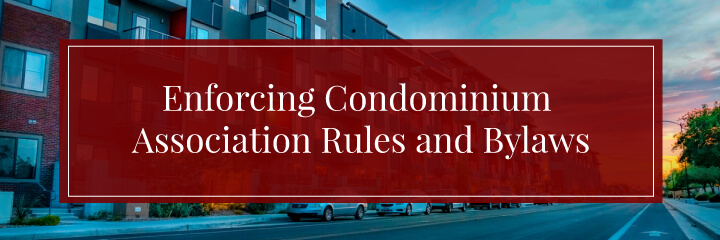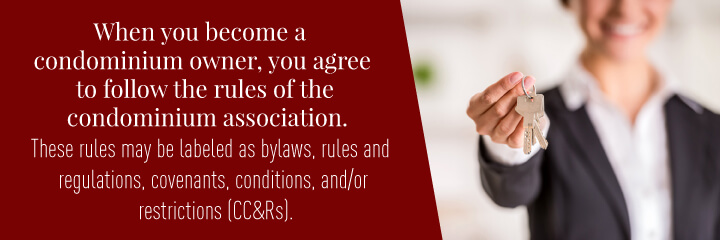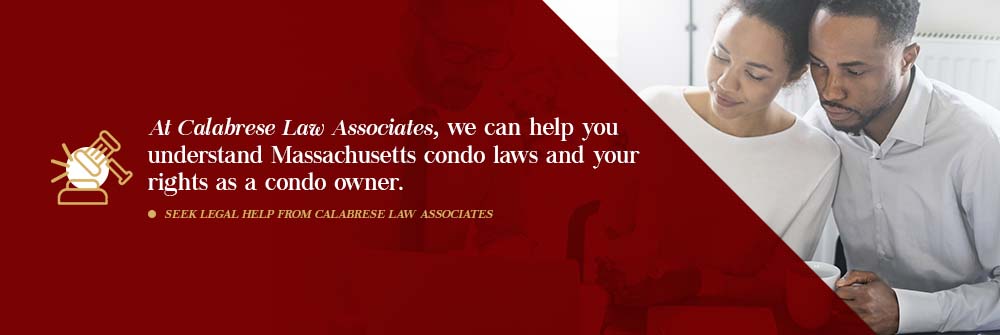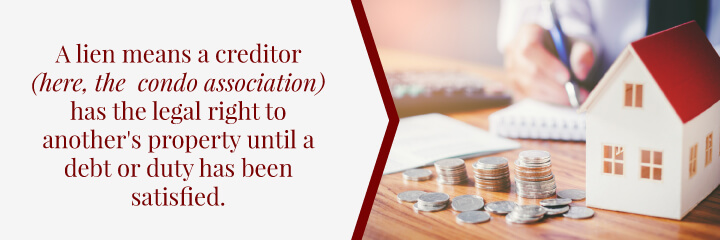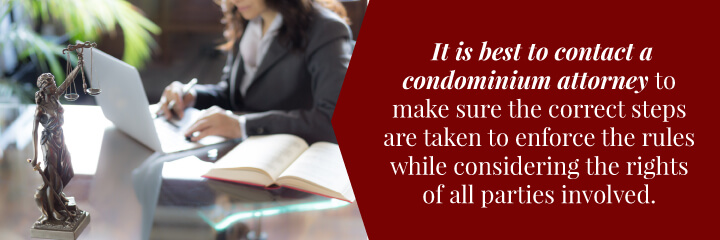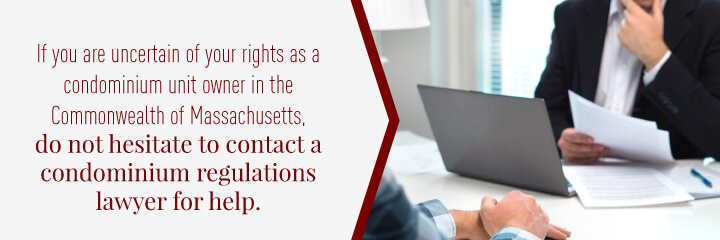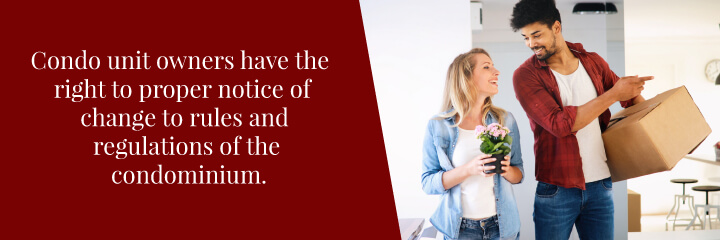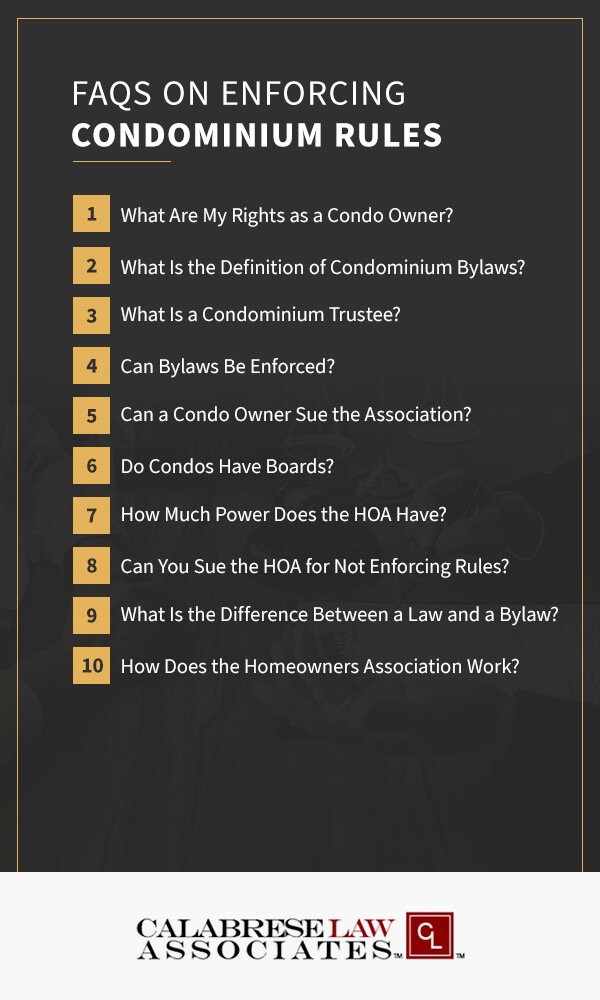Enforcing Condominium Association Rules and Bylaws
Condominiums are the perfect home choice for individuals who want to live in a community with certain amenities, such as a swimming pool, and have no desire to undertake traditional property ownership responsibilities such as home repair maintenance or lawn care. Many condos are in highly desirable areas and generally are priced lower than buying a single–family house in the same neighborhood. Condominium living may be a great option for retirees, professionals, or those looking for the investment opportunity of renting the condo unit.
If you own a condominium, you probably already know the benefits of being a member of the condominium community. However, sometimes disputes arise as a result of sharing common areas with others. You need to know your legal rights as a condo owner to be in a position to properly handle a condominium dispute.
Contact Our Condo Attorneys Now
When you buy a condo, you become a member of a condominium association, which is essentially an entity that all condo unit owners at your property are a part of. Each unit owner is responsible for paying a share of expenses that concern the common areas. The amount of common area expense that a condo unit owner is responsible for paying is based upon the percentage of square footage that their unit represents. Thus, if a condo unit represents 10% of the square footage at the condominium property, its owner is responsible for 10% of the common area expenses. An example of a common area expense is pool maintenance – funds from the condo association reserve would be used to pay those costs. Similarly, a condominium roof leak is another example of a common area expense.
As a condo owner and member of your condominium association, you will be required to pay a monthly association fee. A unit owner’s failure to pay common fees has severe consequences under Massachusetts condo laws.
Seek Legal Help From Calabrese Law Associates
At Calabrese Law Associates, we can help you understand Massachusetts condo laws and your condo owner rights. We provide our clients in Boston, Burlington, and the Greater Boston Area with industry-leading representation in all legal matters, from condominium disputes, construction defects, and real estate law to private nuisances and negotiation, litigation and trial representation, and administrative law.
We place the interests of our clients first to help them achieve their goals. Our condo attorneys aim to work efficiently and effectively while being accessible to every client, which means we return phone calls as soon as possible.
Our condominium law attorneys are here to help you resolve condo rule disputes and enjoy your condo unit. Each of our lawyers specializes in specific areas of practice and possesses the necessary knowledge to use every option available to you under the law. Our top priority is achieving the best result possible for each of our clients. For more information about Massachusetts condo law, condo owner rights, or other legal assistance with your condominium, contact us at Calabrese Law Associates.
What Are Condominium Rules and Bylaws?
When you become a condominium owner, you agree to follow the rules and regulations of the condominium association. These condominium rules may be labeled as bylaws, rules and regulations, or covenants, conditions, and restrictions (CC&Rs).
To be sure that members of the condo association make fair decisions and follow the condo rules, they must also follow bylaws, which are rules regulating the members of the association. Bylaws should include the following at all times:
- The method of payment for necessary work of maintenance, repairs, and replacements of common areas
- The method of collecting fair shares for expenses from unit owners
- The procedure for hiring all personnel
- The method used for both adopting and amending administrative rules and regulations that govern the common areas
- Requirements and restrictions respecting the maintenance and use of units and common areas as not set forth by the master deed to prevent unreasonable interference
Condo owner rights and condo association rights can be confusing sometimes and become a major cause of dispute. How much freedom does a condominium owner have? What power does a condominium association have for the benefit of the whole condominium community? What are your rights as a condo owner?
We will look at this topic in–depth to help create a more defined image of the condo owner rights and responsibilities of unit owners and condo association members, with a focus on common issues such as noise control. If you need assistance understanding the role of homeowner associations, do not hesitate to contact the trusted condo attorneys at Calabrese Law Associates today.
Are Condo Bylaws Legally Binding?
Yes, condo bylaws can be legally binding. Sometimes, it takes drastic measures to make sure condominium rules are followed for the good of the whole community. The condo association (sometimes referred to as a “condo board” or “condo trust”) for a condominium enforces rules and bylaws by exercising its power to place liens on condo units.
A lien means a creditor (here, the condo association) has the legal right to another’s property until a debt or duty has been satisfied (Chopp & Daher, § 8.3.3). In other words, if a condo owner fails to pay association fees, the condominium association may sell the property through a foreclosure and evict the condo unit owner.
In the Commonwealth of Massachusetts, a condominium association is granted the power to impose fines on condominium owners who fail to pay the condo fees and special assessments; the right to use a lien as a means to enforce payments of these charges is powerful. Liens can be used to enforce both restrictive covenants — or restrictions on personal behavior — and affirmative covenants — or financial obligations. Any conduct that generates fines is subject to creating a lien on the condo unit if left unpaid. The right to use a lien allows associations to remove consistently delinquent unit owners from a condominium community.
However, although a condominium association has the right to use a lien, the lien must ultimately be enforced through the court system (§ 8.8.1). Therefore, the amount of the lien and the authority to foreclose on the lien is granted by a Massachusetts court of law. Once it is determined that a unit may be sold, a public auction will be conducted for the sale of the unit.
Points to remember about a lien on a unit include the following:
- A lien is used to enforce an owner’s failure to pay any common expenses from the time the payments are due.
- The lien does not come into effect until fees are unpaid.
- A lien is used to enforce a unit owner’s obligation to reimburse the association for any expenses resulting from a unit owner’s failure to abide by the rules of the trust, rules and regulations, bylaws, or master deed.
Sometimes a lien is not necessary, and a condominium association can take steps to enforce Massachusetts condo laws in other ways. For example, associations have the right to:
- Estimate late charges to enforce an owner’s obligation to timely payments
- Impose fines for violations of the master deed, bylaws, or rules and regulations
- Contact unit owners and seek direct payment of rent
- Enforce condo rules that interfere with the maintenance of shared common areas
Associations do not have the right to:
- Charge unreasonable interest rates
- Imposes fines and fees for unreasonable rules and regulations that do not serve a legitimate purpose
- Impose fines or fees for rules and regulations that are not set out in the master deed, declaration of trust, or the condo association’s bylaws
It is ideal to settle issues before taking a problem to court. However, if a condo association decides to use a lien as enforcement and foreclosure to collect payment, it must follow all statutory requirements, such as giving a unit owner proper notice before taking foreclosure action.
Rule enforcement can get complicated for both the association and condominium owners. It is best to contact a condominium attorney to make sure the correct steps are taken to enforce the condo rules while considering the rights of all parties involved.
What Are the Rights and Responsibilities of Unit Owners and the Condominium Association?
According to Massachusetts condo law, each condominium unit owner is entitled to the exclusive ownership and possession of their unit. Owning a condominium is like owning a home. The greatest difference is that you share common areas, are generally sharing a “structure” with our unit owners (i.e. usually more than one unit is located within the same building), and must follow the rules of the condominium. Common areas are those areas collectively owned by unit owners but under the exclusive control of the condominium association. Common areas include parking lots, swimming pool areas, and the surrounding land. This difference is where most issues arise.
Both condominium unit owners and the condo association have rights. For everyone to live in peace, condo rules need to be in place and enforced. It is critical for all unit members to have a clear understanding of their rights at all times. They must also know what to expect when rules are broken, and they need to understand what the condo association is allowed to do to maintain the proper operation of the condominium.
1. Condo Owner Rights and Responsibilities
If you are a unit owner, your condominium is your home. As with any home, no one has the right to tell you how to live within your unit. However, as a condominium owner, you also own a portion of common area property, along with other unit owners. When you agree to own a condominium, you give up a certain amount of freedom and even privacy. Unlike a regular single–family home, which is generally situated upon its own lot of land, with a condominium, you do not have the freedom to do as you wish with the exterior of the condo property.
Every condominium community can set their own rules. Typically, the unit owner has the right to:
- Hold exclusive ownership and possession of their unit
- Rent or lease the individual unit
- Bring issues to the attention of the association
- Have reasonable expectations placed by the association
- Receive proper notice before a foreclosure action is taken
- Vote as a member of the association, as well as protest condo association decisions and/or action
- Receive notice of changes made to any condo rules or regulations
It is important to note that some of the above condo owner rights may vary according to the master deed and declaration of trust documents. Also, keep in mind that all claims involving common areas must be brought against the association. If you are uncertain of your rights as a condominium unit owner in the Commonwealth of Massachusetts, do not hesitate to contact the condo attorneys at Calabrese Law Associates for help.
Obviously, as a unit owner who is also part owner of common areas, you also have responsibilities. Your first one is to understand the master deed, bylaws, and rules and regulations. You will make better decisions as an associate member as a result. Other important responsibilities include the following:
- Pay your share of condominium expenses.
- Fulfill your obligations as declared in the master deed and trust documents.
- Comply with the condo bylaws and administrative rules, regulations, and restrictions on the use of the unit contained either in the master deed or unit deed.
- Pay any expenses related to the selling of your unit resulting from a failure to make payments. These expenses may include advertising costs and auctioneer and attorney fees.
- Do not interfere with the health and happiness of other unit owners by acting unreasonably.
2. Condominium Association Rights and Responsibilities
Although the condominium association is composed of individual unit owners, the association as an entity has certain rights and responsibilities. In general, the purpose of a condominium association is to make sure all unit owners pay their fair share of expenses and abide by condo rules in support of an enjoyable and beneficial living experience for all members of the condominium community. To make sure fairness is upheld, the association has the right to:
- Enforce rules, regulations, and payments with a lien
- Foreclose a lien for repayment of fines
- Solicit payment for fines, fees, or rent
- Enter a unit during reasonable hours to maintain or repair any common area accessible from the unit (M.G.L.A. c. 183A § 4 [2])
- Enter a unit to make emergency repairs that prevent damage to other units or common areas
- Remove an offending unit owner from the condominium community (§ 8.3)
- Enforce covenants relating to owner behavior with a lien
- Impose fines and costs on disobedient unit owners ( § 8.3.3)
- Enforce a unit owner’s obligation to pay all fines, fees, court costs, attorney fees, late charges, costs of collections and enforcement, and other expenses related to unit owner obligations
- Amend a master deed, trust, bylaws, rules, and regulations to provide additional solutions, protections, or rights (§ 8.8.3)
It may seem like a condo association has a lot of power – it does. However, condo unit owners have the right to the proper notice of a change to rules and regulations of the condominium. As a condo association, it might be best to seek the advice of an attorney before taking action against a unit owner or making changes to important documents.
The condominium association has some important responsibilities. The primary responsibilities include (not an exhaustive list):
- Provide notice to the unit owner before a foreclosure action is initiated.
- Create reasonable unit restrictions (G.L. c. 183A, § 4 [3]).
- Adhere to condominium bylaws, the master deed, and rules and regulations.
- Use association fees and funds as intended.
- Set reasonable interest rates, fines, fees, and other costs.
- Make decisions that benefit the condo community as a whole.
- Enforce condo rules and regulations equally.
FAQs on Enforcing Condominium Rules
Below are some of the frequently asked questions we receive on enforcing condominium rules and HOA rules and regulations:
1. What Are My Rights as a Condo Owner?
As a condo owner, you have the right to use your unit as provided in the master deed – if it’s a residential condominium unit – in a way that allows you to maintain a reasonable standard of living as required by Massachusetts health, safety and building laws. Your legal rights as a condo owner also include:
- The right to protest.
- The right to take legal action against the HOA.
- The right to adequate notice of board meetings.
- The right to access certain condominium association documents.
- The right to vote and run for a board position during elections.
2. What Is the Definition of Condominium Bylaws?
In general, condominium bylaws are used to outline the procedures and rules for how an HOA is operated. Condo bylaws can also include the board’s responsibilities and duties, the number of board members, the frequency of the board meetings, and the length of a board member’s service term. Every condominium may use the bylaws in slightly different ways or have no bylaws at all.
3. What Is a Condominium Trustee?
A trustee is a member of a trust that manages and operates a condominium property; they share the responsibility for handling the many aspects involved in an HOA, including financial and maintenance requirements. A condo trustee is also required to hold meetings in which roles are elected, such as the role of president, treasurer, and secretary.
4. Can Bylaws Be Enforced?
Bylaws can be enforced by the condominium association through formal proceedings (or by a unit owner through a MRCP 23.1 derivative action) such as in court. Review your HOA’s governing documents to identify how a dispute can be resolved and how bylaws may be enforced.
5. Can a Condo Owner Sue the Association?
You can sue the association if you believe you have been unfairly punished by your HOA. If your HOA believes you have violated its rules, you could be forced to comply or be fined. In the event that you are punished by your HOA, you have the right to sue.
6. Do Condos Have Boards?
Condos have boards of elected officials that include a president, secretary, vice president, and treasurer. A condo board is in charge of the condo’s management and governance. Your condo board will establish policies for the condominium association and make major decisions.
7. How Much Power Does the HOA Have?
Your HOA has quite a bit of power. The association may be able to choose what plants you can grow, what color you can paint your house, and whether you can rent out your condo. Be sure to review the documents for your HOA to determine what power lies with the HOA and what decisions you can make without needing approval.
8. Can You Sue the HOA for Not Enforcing Rules?
Some cases may arise in which you believe your HOA is not enforcing the rules or maintaining common areas. In an HOA’s governing documents, the covenants, restrictions, and rules detail how you can and cannot use your property, such as how you are allowed to paint your driveway, when you need to get approval before adding on to your condo, and what kind of landscaping you can include.
If you believe your HOA is not enforcing the rules or performing its duties, you may choose to sue the HOA.
9. What Is the Difference Between a Law and a Bylaw?
Laws are created by the state legislatures, U.S. Congress, and enforced by the courts as well as the executive branches of the government. Bylaws are a contract-type document that is adopted by the creator of a condominium and/or the condominium association, which functions as a set of rules specific to that condominium only. Massachusetts law states that condominium unit owners take their units subject to the rules of the condominium, including its bylaws.
10. How Does the Homeowners Association Work?
An HOA consists of property owners living in a specific condominium, and the HOA maintains common areas and ensures building restrictions are enforced. An HOA’s obligations tend to include:
- Performing duties reasonably and fairly.
- Acting in the best interests of the community.
- Following the regulations and rules as listed in the governing documents.
The areas that may fall under an HOA’s responsibility as “common areas and facilities” for maintenance include community pools, elevators, structural building components, clubhouses, most exterior areas of the condominium property, central systems and utility service equipment, and parks. However, every condominium can define it’s common areas and facilities in different ways so its important to consult with the Boston-based condominium lawyers at Calabrese Law Associates if you need assistance in determining the rights and obligations of the unit owners versus the condominium association (HOA) at your Massachusetts condominium property.
Contact Calabrese Law Associates for Help With Condominium Disputes
When it comes to the Massachusetts condo law, there is always so much to consider. It can be incredibly difficult to understand your condo owner rights and the rights of other condo owners. If you are a condominium unit owner or member of a condominium association and in the midst of a dispute, it is best to seek expert legal advice. A lot may be at stake, and the experienced condo attorneys at Calabrese Law Associates will make sure you do not make a mistake that you will later regret.
Calabrese Law Associates is on your side. We can help you resolve the most complex disputes, no matter how many parties are involved. You deserve to enjoy your condominium as a unit owner and association member. We want to help you gain an understanding of your condo owner rights, the condo rules, and how you can take charge of your situation and future. For more information or to speak with our dedicated condo attorneys, contact Calabrese Law Associates today.
While Calabrese Law Associates does offer legal help for landlord-tenant disputes, it is extremely rare that we take on these cases. Only about 1% of tenant-related cases and 10% of landlord-related cases will be considered by our law firm.
* This publication and its contents are not to be construed as legal advice nor a recommendation to you as to how to proceed. Please consult with a local licensed attorney directly before taking any action that could have legal consequences. This publication and its content do not create an attorney-client relationship and are being provided for general informational purposes only.
* Attorney Advertising. Prior results do not guarantee a similar outcome.


